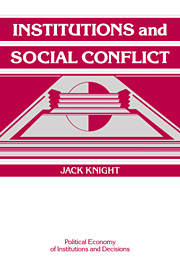Book contents
- Frontmatter
- Contents
- Series editors' preface
- Preface
- CHAPTER 1 INTRODUCTION
- CHAPTER 2 THE PRIMARY IMPORTANCE OF DISTRIBUTIONAL CONFLICT
- CHAPTER 3 INSTITUTIONS AND STRATEGIC CHOICE: INFORMATION, SANCTIONS, AND SOCIAL EXPECTATIONS
- CHAPTER 4 THE SPONTANEOUS EMERGENCE OF SOCIAL INSTITUTIONS: CONTEMPORARY THEORIES OF INSTITUTIONAL CHANGE
- CHAPTER 5 THE SPONTANEOUS EMERGENCE OF SOCIAL INSTITUTIONS: A BARGAINING THEORY OF EMERGENCE AND CHANGE
- CHAPTER 6 STABILITY AND CHANGE: CONFLICTS OVER FORMAL INSTITUTIONS
- CHAPTER 7 CONCLUSION
- Bibliography
- Index
CHAPTER 2 - THE PRIMARY IMPORTANCE OF DISTRIBUTIONAL CONFLICT
Published online by Cambridge University Press: 16 September 2009
- Frontmatter
- Contents
- Series editors' preface
- Preface
- CHAPTER 1 INTRODUCTION
- CHAPTER 2 THE PRIMARY IMPORTANCE OF DISTRIBUTIONAL CONFLICT
- CHAPTER 3 INSTITUTIONS AND STRATEGIC CHOICE: INFORMATION, SANCTIONS, AND SOCIAL EXPECTATIONS
- CHAPTER 4 THE SPONTANEOUS EMERGENCE OF SOCIAL INSTITUTIONS: CONTEMPORARY THEORIES OF INSTITUTIONAL CHANGE
- CHAPTER 5 THE SPONTANEOUS EMERGENCE OF SOCIAL INSTITUTIONS: A BARGAINING THEORY OF EMERGENCE AND CHANGE
- CHAPTER 6 STABILITY AND CHANGE: CONFLICTS OVER FORMAL INSTITUTIONS
- CHAPTER 7 CONCLUSION
- Bibliography
- Index
Summary
In giving an explanation of a social institution, either of its maintenance and stability or of its development, we focus initially on the impact of that institution on a particular aspect of social life: the difference that the existence of the institution makes for social interactions. This “impact” may be called an effect, a benefit, a satisfaction of a need, or whatever, depending on the type of explanation offered. The persuasiveness of the explanation, however, depends on more than a description of an “impact”; it depends on the elaboration of a mechanism that connects the impact to some cause, intention, functional adaptation, or whatever: how the particular institution developed and why it took the form that it did. Here we connect the what with the how and why. Because my interest is in the development of theories that combine rational action with institutional structures, my attention here is on mechanisms that connect the benefits of social institutions with the intentions of social actors. The basic argument of this chapter is that although social institutions may have a number of discernible benefits, some do better than others in providing the how and why.
In the first section I briefly discuss the benefits provided by a variety of social institutions. These examples are offered to highlight the relationship between the collective and distributive benefits of these institutions.
- Type
- Chapter
- Information
- Institutions and Social Conflict , pp. 21 - 47Publisher: Cambridge University PressPrint publication year: 1992
- 1
- Cited by

